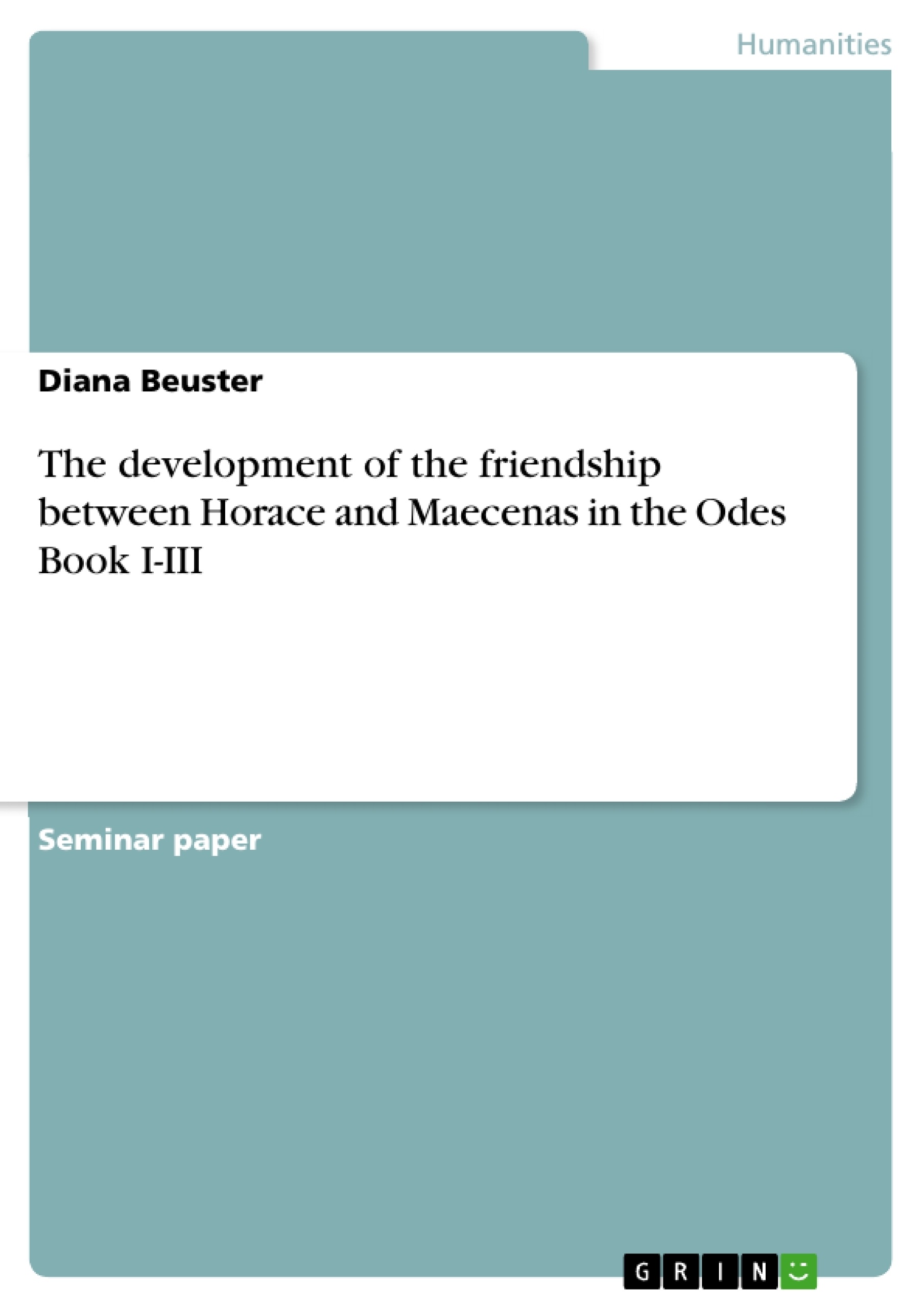“The friendship between Horace and Maecenas quickly attained an almost mythical status as the ideal relationship of poet and patron.” With these words Barbara Pavlock (B.Pavlock, Horace’s invitation poems to Maecenas: gifts to a patron, in: Ramus 11 (1982), 79) starts her article about the invitation poems of Horace, and for a long time it really seemed to most of the people that this relationship was an ideal friendship, but this point of view changed within the last decades.
This paper is giving a short view on the relationship between Maecenas and Horace from the Horacian point of view, extracted from the Odes I – III of Horace.
Inhaltsverzeichnis (Table of Contents)
- The Development of the Friendship between Horace and Maecenas
- The Invitation Poems of Horace
- Horace and Maecenas: A Historical Perspective
- The First Book of Odes
- Ode 1.1: A Tribute to Maecenas
- Ode 1.20: A Familiar Invitation
- The Second Book of Odes
- Ode 2.17: A Response to Maecenas' Illness
- Ode 2.20: A Growing Separateness
- The Third Book of Odes
- Ode 3.8: A Distraction for Maecenas
Zielsetzung und Themenschwerpunkte (Objectives and Key Themes)
This paper examines the developing friendship between Horace, the Roman poet, and Maecenas, his patron, through an analysis of the Odes, Books I-III. The paper aims to understand the nature of their relationship and the dynamic interplay of power and friendship in their interactions. It also explores how this relationship evolved from one of patron and client to a more equal partnership.
- The evolution of the relationship between Horace and Maecenas.
- The interplay of power and friendship in their interactions.
- The role of Horace's Odes in portraying their relationship.
- The implications of Horace's increasing independence.
- The impact of social conventions on their interactions.
Zusammenfassung der Kapitel (Chapter Summaries)
The analysis begins by examining Horace's invitation poems to Maecenas. These poems reveal a gradual shift from a patron-client relationship to a more intimate friendship.
The paper then moves on to analyze Odes 1.1 and 1.20, both of which are addressed to Maecenas. Ode 1.1 expresses gratitude and respect, while Ode 1.20 demonstrates a growing familiarity and confidence in their relationship.
The second book of Odes continues to explore the evolution of the relationship, particularly in Ode 2.17. This ode, written in response to Maecenas' illness, reflects a deepening of their friendship and a shared sense of dependence. Ode 2.20 further suggests Horace's growing independence and the recognition of their distinct identities.
Finally, the paper examines Ode 3.8, an invitation from Horace to Maecenas that underscores Horace's growing influence and the reciprocal nature of their relationship.
Schlüsselwörter (Keywords)
The key terms and concepts of the text include the Roman lyric and elegy, the friendship between Horace and Maecenas, patron-client relationships, Roman social conventions, Horace's Odes, and the development of a literary partnership.
Frequently Asked Questions
How did the relationship between Horace and Maecenas evolve?
The relationship shifted from a traditional patron-client dynamic to a more equal and intimate friendship, as reflected in Horace's Odes.
What role do the "invitation poems" play in their friendship?
These poems show a gradual change in tone, moving from formal respect to a familiar and confident interaction between the poet and his patron.
What is the significance of Ode 1.1?
Ode 1.1 serves as a tribute to Maecenas, expressing Horace's gratitude and establishing the framework of their professional and personal bond.
How does Ode 2.17 reflect their deepening bond?
Written during Maecenas' illness, this ode highlights a shared sense of dependence and the emotional depth of their connection.
Does Horace become more independent over time?
Yes, later odes like 2.20 and 3.8 suggest Horace's growing literary influence and a recognition of his distinct identity apart from his patron.
Was their friendship considered "ideal" in Roman society?
While traditionally seen as a mythical ideal of poet and patron, modern research suggests a more complex interplay of power and social conventions.
- Arbeit zitieren
- M.A. Diana Beuster (Autor:in), 2006, The development of the friendship between Horace and Maecenas in the Odes Book I-III, München, GRIN Verlag, https://www.grin.com/document/77508



